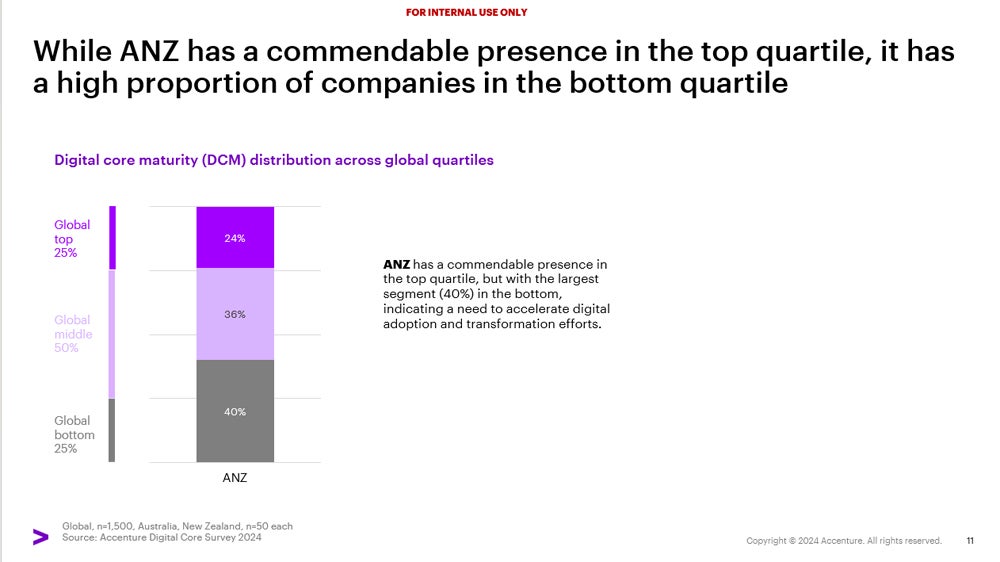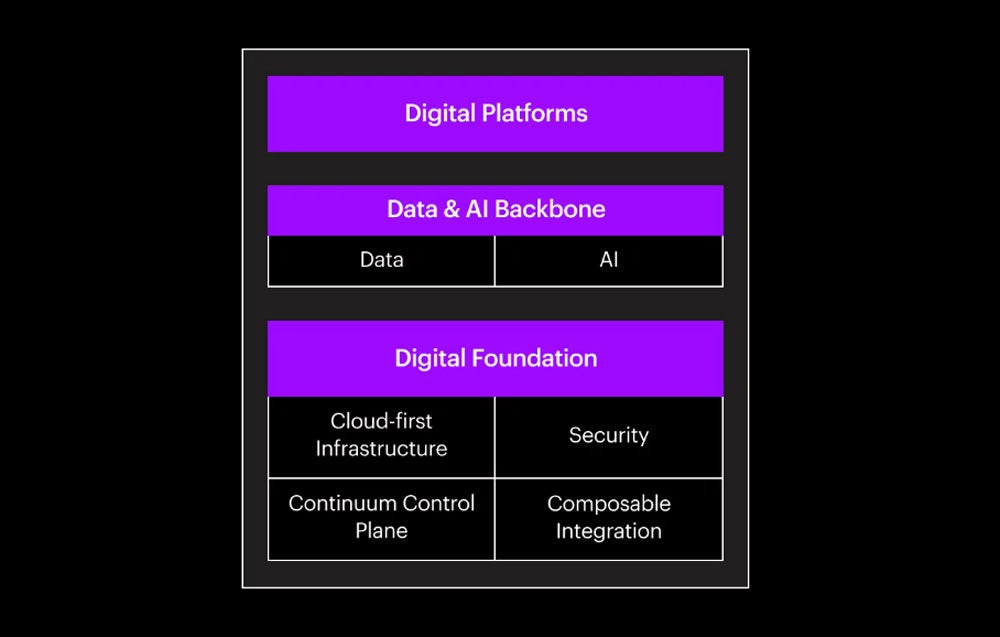A disproportionately large portion of Australia’s local companies are struggling to keep up with the pace of global digital adoption and transformation, according to new data from the local arm of Accenture.
The consulting firm found 40% of local companies fall in the bottom quartile of companies when ranked by their digital maturity level against global competitors in countries in North America, Europe, and Asia.
Matt Coates, technology lead at Accenture Australia and New Zealand, told TechRepublic:
- Local companies will need to consider investing more of their IT budgets in strategic innovation rather than merely maintaining existing systems to keep pace.
- Companies must also take a balanced approach to managing technical debt, with Accenture advising clients to direct 15% of IT budgets to debt remediation.
Digital maturity was ranked based on how advanced they are in adopting a “digital core” — a term Accenture uses to describe the cloud infrastructure, digital platforms, data architecture, and security backbone that allow for an organisation to innovate and grow.
 Matt Coates, technology lead, Accenture Australia and New Zealand
Matt Coates, technology lead, Accenture Australia and New ZealandAustralian companies not as digitally mature as global counterparts
Accenture ranked global companies’ digital maturity in its Reinventing with a Digital Core report. It revealed 40% of 50 Australian organisations surveyed were placed in the “global bottom” quartile of companies — meaning Australia has more than its fair share of businesses not meeting this standard.
In contrast, Australia’s top companies measured favourably with the rest of the world: 24% of local organisations were represented in the global top 25%. An additional 36% were assessed as either falling in the “global middle” on digital maturity or the middle two quartiles.
 40% of Australian organisations fall into the digital maturity “global bottom.” Image: Accenture
40% of Australian organisations fall into the digital maturity “global bottom.” Image: Accenture“We’ve been aware for some time there is a wide range in the digital capabilities across organisations in Australia,” Coates said. While he said the top quarter of Australia’s leading organisations are seemingly keeping pace with global counterparts, “there is then quite a sharp drop off” to those at the bottom, he noted.
Growth and profit being left on the table
Australian organisations lagging in digital transformation may be missing out on significant business benefits. Accenture’s research suggests that companies with an advanced digital core are experienced:
- 20% higher revenue growth rates.
- 30% higher profitability globally.
 Accenture believes a strong digital core will help organisations innovate and grow. Image: Accenture
Accenture believes a strong digital core will help organisations innovate and grow. Image: AccentureWhen combined with investments in strategic innovation and a balanced approach to technical debt, these efforts can lead to a 60% higher revenue growth rate and 40% higher profits, Accenture found.
SEE: Australian enterprises coming 4th in 2024 global survey of generative AI use
What factors are holding companies back?
Accenture outlined several reasons for Australian organisations lagging global competitors in digital adoption.
A ‘short-term’ mindset
Some business leaders still mistakenly view digital transformation as a cost rather than a growth driver, according to Accenture. “We know this is not the case with the right strategy in place, but this short-term mindset does persist, and it results in inadequate investment in technology,” Coates said.
Balancing tech debt with innovation spend
Many organisations are struggling to manage tech debt in ways that allow them to innovate. “Managing technical debt remains a significant challenge; many organisations fail to balance spending between debt remediation and future growth investments,” Coates explained.
Cultural resistance to digital and change
Even if CIOs, CTOs, or CFOs across Australia are strong advocates for digital adoption and maturity, internal cultural resistance can still hold them back. Coates said that, to the frustration of senior technology leaders, there are often difficulties having this embraced across local organisations.
Technology challenges include human factor
Accenture’s research indicates that while many ANZ executives have adopted digital platforms, 61% report that these platforms are not being effectively utilised within their organisations. An additional 41% say that integrating these new technologies is an outward struggle.
Coates attributes some digital adoption issues to people within the organisations rather than technology itself.
“In the market, we see these types of problems occurring if effective change management and talent upskilling programs are not included in the technology strategy,” he explained.
Hybrid cloud, data governance, and cybersecurity risk are all challenges
Technologies that local organisations are struggling to adopt in particular include:
Cloud: Accenture sees partial cloud migrations as a problem. “Cloud transformation often stalls due to the complexities of hybrid environments and legacy systems,” Coates said.
SEE: Gartner’s 7 big predictions for cloud computing
Data: Australian businesses are facing challenges ensuring data quality and governance, something “critical for effective decision-making and [for] adopting new emerging technologies like Gen AI,” Coates noted.
Cybersecurity: Organisations are having to strengthen security frameworks and compliance measures to protect against evolving threats and to ensure regulatory adherence as risks grow exponentially.
How to boost your organisation’s digital core maturity
Coates laid out three recommendations for businesses looking to build a leading digital core.
Teach stakeholders about the benefits of a strong digital core
Educating stakeholders is a crucial part of the digital transformation battle. Accenture argues for Australian IT leaders to focus on educating their entire organisations about the importance of a strong digital core. Coates said this is no longer confined to the “tech department.”
“Technology is at the core of every business now, and the potential of AI will keep it there,” Coates noted.
“Once all leaders understand how critical the digital core is to a company’s ability to adopt new technologies and stay agile and competitive, they are more likely to show the commitment needed to invest in a strategic program of work to deliver digital transformation.”
Allocate enough IT budget to strategic innovation for the future
Companies should consider investing more of their IT budgets in strategic innovation rather than merely maintaining existing systems. Accenture’s global research showed leading quartile companies were consistently increasing IT budgets in strategic innovation by at least 6% year-over-year.
However, Coates said it is crucial to balance this investment in innovation with the need to manage technical debt.
“We advise our clients that approximately 15% of IT budgets should go towards debt remediation to maintain evergreen IT capabilities while investing in future growth,” he said.
Create a culture that puts digital supremacy first
Finally, Coates said a cultural shift towards continuous reinvention is needed, with a focus on:
- Developing digital skills.
- Encouraging innovation.
- Fostering an environment that embraces change.
“By addressing these areas,” he explained, “ANZ organisations can close the digital gap and better compete on the global stage.”
 5 months ago
47
5 months ago
47